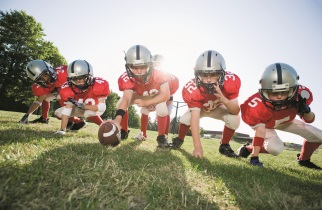June 2019
Stay Ahead of the Game: Updated Guidelines for Managing Concussions in Kids
As you stand on the sidelines cheering for your young athlete, you’re likely filled with a spectrum of emotions. There’s excitement, pride, and perhaps a little fear that your child could get injured. As a parent, one of the injuries you may worry about most is concussion.

Fortunately, research about concussions in young athletes is rapidly expanding in order to help health care providers and parents better manage them and prevent long-term complications. Recently, the American Academy of Pediatrics (AAP) updated its guidelines for managing concussions in children and adolescents for the first time since 2010.
What’s new?
A concussion is a type of traumatic brain injury that’s caused by a blow to the head, face, neck, or somewhere else on the body that transmits the force to the head. It creates chemical changes in the brain that temporarily affect how the brain works—affecting balance, reaction time, learning, and memory.
In the new report, the AAP reemphasizes removing a child from play if a concussion is suspected. Children who keep playing right after a concussion have worse symptoms and a longer recovery time than those who are taken out of the game right then. If a child gets another head injury within 24 hours, recovery becomes even longer and more difficult.
The previous AAP report highlighted the importance of physical and mental rest after a concussion. But recent research shows that physical activity is fine, and even helpful, for healing. The AAP now recommends allowing for some light activity, such as brisk walking, as long as it doesn’t make any symptoms worse. Work with your child’s pediatrician to find out how soon after a concussion your child is ready to start doing some physical activity again.
Another key change to the guidelines is that children may use electronics during recovery. Since kids are so connected with their peers through social media these days, eliminating electronics such as computers, video games, and texting—as previously suggested—could make them feel isolated and contribute to symptoms of depression or anxiety.
Supporting your child’s healing
Most young athletes who suffer a concussion get better within 4 weeks of their injury. During this time, you may need to make some changes to your child’s schedule and daily activities, such as lessening schoolwork and offering lots of rest to aid recovery. If you have any concerns or notice that symptoms are getting worse, be sure to contact your child’s pediatrician.
Connect with us:
Download our App: